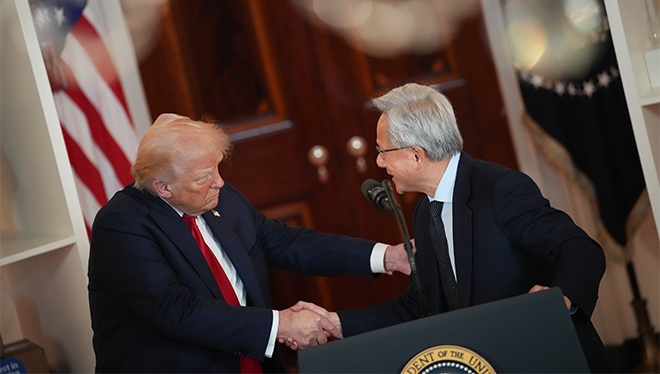Featured Topics
Featured Products
Events
S&P Global Offerings
Featured Topics
Featured Products
Events
S&P Global Offerings
Featured Topics
Featured Products
Events
S&P Global Offerings
Featured Topics
Featured Products
Events
Financial and Market intelligence
Fundamental & Alternative Datasets
Government & Defense
Professional Services
Banking & Capital Markets
Economy & Finance
Energy Transition & Sustainability
Technology & Innovation
Podcasts & Newsletters
Financial and Market intelligence
Fundamental & Alternative Datasets
Government & Defense
Professional Services
Banking & Capital Markets
Economy & Finance
Energy Transition & Sustainability
Technology & Innovation
Podcasts & Newsletters
07 May, 2025

|
US President Donald Trump shakes hands with NVIDIA CEO Jensen Huang after Huang delivered remarks at the White House during an event on "Investing in America." |
Tech companies are exploring short-term strategies to navigate global tariff uncertainty while holding off on long-term decisions about manufacturing and expansion.
It has been more than a month since the Trump administration announced a sweeping range of tariffs on imports from scores of countries, but executives and industry experts remain unclear on what duties will be in effect in the months and quarters to come. US President Donald Trump has imposed 145% tariffs on imports from China, while most other countries are subject to 10% tariffs amid a 90-day pause announced April 9. China has retaliated by raising tariffs on US goods to 125%, though Washington and Beijing have some exemptions in place for semiconductors. US Commerce Secretary Howard Lutnick said the exemption is temporary, with chips and other electronics set to be covered under new sector-specific tariffs that will be announced in the near future.
The lack of clarity is complicating the outlook for tech companies, with multiple executives citing a lack of visibility beyond the second quarter. Longer term, expectations are low for the potential of major gains for US manufacturing to be realized in the next four years.
"There's a reluctance to move ahead, even with well-laid-out plans, until the whole trade framework [becomes] guidelines," said Stavros Gadinis, a professor and faculty director at the University of California's Berkeley Center for Law and Business. "This is an extreme reversal of times for the tech industry, and something that the industry was definitely not ready to deal with. This element of surprise is a big problem for companies."
Tariff troubles
Among the companies to feel the biggest impact from tariffs is Apple Inc., which has a well-established global supply chain. Although the company has taken steps to diversify away from mainland China, a significant portion of its manufacturing occurs in markets including India, Japan, South Korea, Taiwan and Vietnam.
To minimize the impact of the US tariffs on Chinese imports, Apple CEO Tim Cook told analysts this month that the majority of iPhones sold in the US in the June quarter would be built in India. Meanwhile, almost all iPads, Macs, Apple Watches and AirPods products sold in the US will have Vietnam as their country of origin. "China would continue to be the country of origin for the vast majority of total product sales outside the US," Cook said on the company's May 1 earnings call.
Although iPhones and other consumer electronics are exempt from the 145% tariffs placed on Chinese imports, they are subject to the 20% rate that Trump has tied to the international drug trade, particularly fentanyl.
"We estimate the impact, assuming that the current global tariff rates, policies and applications don't change for the balance of the quarter, to be $900 million to our costs," Cook said. "I wouldn't want to predict the mix of production in the future ... but I wanted to give you clarity for the June quarter of where the country of origins are so you can use that for your modeling."
Consumer sentiment from 451 Research's 2025 Macroeconomic Outlook, Consumer Spending, Sentiment & Expectations survey revealed that 60% of respondents expected consumer electronics to see price increases due to tariff policies on US trade partners.
A strategy businesses could deploy to reduce their exposure to added tariff-related costs is to bifurcate their hardware from embedded software, said Lynlee Brown, a partner in Ernst & Young's Global Trade practice.
Cook and NVIDIA Corp. CEO Jensen Huang have urged the Trump Administration to exempt their products from 145% tariffs imposed on Chinese imports. China dropped its tariffs on US microchips to zero, while maintaining its 125% retaliatory tariff on all other US imports.
Staying agile
Beyond tariffs, chipmakers are also navigating US policies that limit the sale of AI chips to China. In April, NVIDIA said it would record a write-down of up to $5.5 billion in its fiscal first quarter in the face of export restrictions on its H20 chips for the Chinese market.
Huang has pressed for the US to curtail those regulations.
"China is a very large market. It's probably going to be a $50 billion AI market in two or three years," Huang told CNBC on May 6. "It would be a tremendous loss not to be able to address it as an American company."
Also in April, NVIDIA announced plans to commission more than a million square feet of manufacturing space to build and test NVIDIA Blackwell chips in Arizona and AI supercomputers in Texas.
On CNBC, Huang stressed the importance of staying "agile" as a company. "Whatever the policies are of the government, whatever's in the best interest of our country, we'll support," he said.
Agility, though, is a luxury that is easier for some companies to afford than others. Larger, high-tech companies with more margin room can absorb impacts better than smaller manufacturers, said Ross Meyercord, CEO of Propel Software.
"One of the meta lessons to be learned here between COVID-19 and tariffs and trade wars is that resiliency and optionality are critical," Meyercord said. "We, of course, have to be cost-effective through this, but we need to find a way to blend optionality and alternate sources, alternate approaches as a way to mitigate risk."